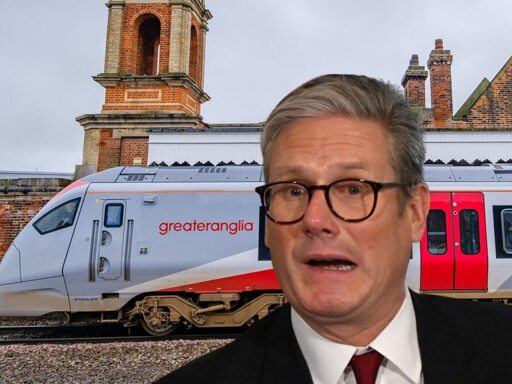The Labour Party government has championed Greater Anglia rail operator coming under public ownership as its contract expired on 12 October. But in doing so, it exposed itself over every other privately-run public service.
Greater Anglia: the litmus test
Transport minister Heidi Alexander said the move to nationalisation for Greater Anglia will be:
generating greater revenue and reducing costs
The thing is, the removal of private profit from natural monopolies always reduces costs and brings greater revenue. That’s because the money that would go to shareholders can go to bringing down prices for the public or to contributing to investment. And public borrowing costs are cheaper than private, before one gets to the possibility of quantitative easing.
So with Labour enthusiastic about nationalising rail operators like Greater Anglia, what about public ownership of the trains themselves, water and energy – for instance? The government has essentially admitted that public ownership has key benefits.
What about the rest of the natural monopolies?
Yet Labour is only nationalising the rail operators – like Greater Anglia – not the actual trains themselves. We will still rent these from private companies. That’s despite the company shareholders making over £2bn in the past decade in dividends.
Railways and of course the trains themselves are a natural monopoly. That’s because a business cannot build another train station in a town or city to compete with the existing station that’s already in the area. That would make no practical sense, take up too much space unnecessarily and be very expensive.
Passengers need to get a train at a certain time and they have no real choice but to get the train at the nearest station. So they will buy a ticket for that train and that train only. In other words, there is no market competition between railway operators whatsoever over rail fares.
Water and energy
Moreover, never mind Greater Anglia.
When it comes to water, Labour has used fake figures cooked up by the water industry itself to argue that the initial cost of public ownership would be too expensive. United Utilities, Anglian Water, Severn Trent and South West Water commissioned a 2018 paper by the Social Market Foundation, which the government has referenced. Labour used it to argue the cost would be £90bn, posing a “huge burden on the public purse”.
But the opposite is true, according to Ewan McGaughey, professor of law at King’s College London. As well as the cost of nationalisation being zero (or negative), a University of Greenwich study for We Own It has found that there is a “privatisation tax” of 35% on our water bills.
Nationalisation of energy to aid the transition to renewables would also bring down costs for every individual and business in the country. Yet secretary for energy and climate change Ed Miliband has said public ownership “wouldn’t be a solution to the problem we face”.
Labour has let the cat out the bag by nationalising rail operators like Greater Anglia. Now they should get to bringing the rest of our once public utilities back into common ownership.
Featured image via the Canary
By James Wright
From Canary via this RSS feed


